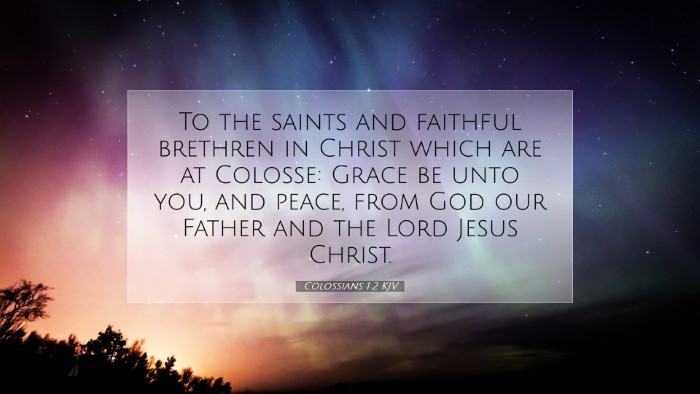Commentary on Colossians 1:2
Verse Text: "To the saints and faithful brethren in Christ which are at Colosse: Grace be unto you, and peace, from God our Father and the Lord Jesus Christ."
Introduction
This brief epistle to the Colossians encompasses profound theological truths, practical exhortations, and a greeting that encapsulates the essence of Christian fellowship. Colossians 1:2 specifically addresses the recipients with a declaration of their identity and a prayer for divine grace and peace. Famed theologians and commentators have explored the depths of this verse, providing insights that enrich our understanding of its implications for both historical and contemporary audiences.
Contextual Analysis
The church at Colosse was primarily composed of Gentiles, who had come to embrace the faith of Jesus Christ. Paul’s mention of "saints" signifies their set-apart status as holy individuals consecrated to God. The term "faithful brethren" implies both loyalty to one another and to the teachings of Christ. In this greeting, Paul reaffirms their identity in Christ amidst cultural and spiritual challenges.
Insights from Public Domain Commentaries
Matthew Henry
Henry emphasizes the importance of understanding the recipients of this letter. He notes that referring to them as "saints" affirms their new identity in Christ, free from sin's dominion, raised to a life of holiness. Calling them "faithful brethren" further denotes a shared commitment to the faith among the members of the church, highlighting the necessity of mutual support in spiritual growth.
Albert Barnes
Barnes provides insight into the significance of "grace" and "peace" as foundational elements of the Christian life. He explains that grace indicates God's unmerited favor, which empowers believers to live righteously. The term "peace" reflects not only the tranquility of the heart but also the restoration of relationships—both vertically with God and horizontally with others. Barnes argues that this salutation sets the tone for the entire epistle, reiterating the relationship between divine grace and the believer's state of peace.
Adam Clarke
Clarke elaborates on the phrase "from God our Father and the Lord Jesus Christ," stressing the unity of the Father and Son in the dispensation of grace. He draws attention to how this acknowledgment of the divine source of grace and peace encourages a deeper understanding of the believers' reliance on God. Clark posits that recognizing both the Father and the Son as the originators of grace ensures a holistic view of Christian theology grounded in the Trinity.
Theological Implications
The verse presents a rich theological framework that supports various doctrines fundamental to Christianity:
- Identity in Christ: The term "saints" carries the theological weight of being set apart for God's purposes. This sanctification process is inherent within the life of a believer and should be evident in their conduct.
- Community of Believers: The description of "faithful brethren" indicates a collective identity in Christ, stressing the importance of community within the faith. This unity is essential for sustaining believers through trials and spiritual growth.
- Grace and Peace as Essentials: Grace signifies God's initiative in salvation, while peace reflects the resulting tranquility in a believer's life. Together, they underscore the transformative power of the gospel in the lives of individuals and communities.
- Trinitarian Focus: The reference to "God our Father and the Lord Jesus Christ" demonstrates a foundational Christian doctrine, emphasizing the co-equal and co-eternal nature of the Father and the Son in providing grace and peace.
Application for Today’s Church
The message of Colossians 1:2 remains relevant today as it addresses issues of identity, community, and divine provision. Pastors and church leaders can derive several applications:
- Fostering Identity: Emphasizing the identity of believers as saints can cultivate a culture of holiness and integrity within the church.
- Building Community: Encouraging faithful relationships among believers strengthens the church’s witness to the outside world. Mutual support and accountability are vital for growth.
- Preaching Grace and Peace: Regularly reminding the congregation of God's grace fosters a spirit of gratitude and peace, leading to a more joyful and resilient church.
- Understanding the Trinity: Teaching the doctrine of the Trinity enriches believers' comprehension of God's work in their lives and encourages deeper worship and reverence.
Conclusion
Colossians 1:2 is a profound verse that serves as a microcosm of Paul’s theological exposition in the epistle. By identifying the recipients as saints and faithful brethren, Paul lays the groundwork for understanding their identity and the grace available to them. The insights from renowned commentators like Matthew Henry, Albert Barnes, and Adam Clarke, alongside the theological implications and applications provided, offer a comprehensive approach to grasping the depth and relevance of this verse in both historical and contemporary contexts.


